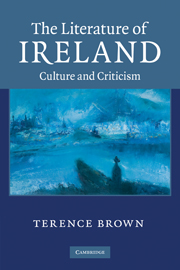Book contents
- Frontmatter
- Contents
- Acknowledgements
- Introduction
- 1 The Literary Revival: historical perspectives
- 2 Joyce's magic lantern
- 3 Music: the cultural issue
- 4 Modernism and revolution: rereading Yeats's ‘Easter 1916’
- 5 Shakespeare and the Irish self
- 6 Irish literature and the Great War
- 7 Ireland, Modernism and the 1930s
- 8 Post-modernists: Samuel Beckett and Flann O'Brien
- 9 Patrick Kavanagh: religious poet
- 10 MacNeice's Irelands: MacNeice's islands
- 11 Louis MacNeice and the Second World War
- 12 MacNeice and the puritan tradition
- 13 John Hewitt and memory: a reflection
- 14 Michael Longley and the Irish poetic tradition
- 15 Seamus Heaney: the witnessing eye and the speaking tongue
- 16 Derek Mahon: the poet and painting
- 17 Telling tales: Kennelly's Cromwell and Muldoon's ‘The More a Man Has the More a Man Wants’
- 18 Redeeming the time: John McGahern and John Banville
- 19 ‘Have we a context?’: transition, self and society in the theatre of Brian Friel
- 20 Hubert Butler and nationalism
- 21 The Irish Dylan Thomas: versions and influences
- Index
- References
5 - Shakespeare and the Irish self
Published online by Cambridge University Press: 05 June 2012
- Frontmatter
- Contents
- Acknowledgements
- Introduction
- 1 The Literary Revival: historical perspectives
- 2 Joyce's magic lantern
- 3 Music: the cultural issue
- 4 Modernism and revolution: rereading Yeats's ‘Easter 1916’
- 5 Shakespeare and the Irish self
- 6 Irish literature and the Great War
- 7 Ireland, Modernism and the 1930s
- 8 Post-modernists: Samuel Beckett and Flann O'Brien
- 9 Patrick Kavanagh: religious poet
- 10 MacNeice's Irelands: MacNeice's islands
- 11 Louis MacNeice and the Second World War
- 12 MacNeice and the puritan tradition
- 13 John Hewitt and memory: a reflection
- 14 Michael Longley and the Irish poetic tradition
- 15 Seamus Heaney: the witnessing eye and the speaking tongue
- 16 Derek Mahon: the poet and painting
- 17 Telling tales: Kennelly's Cromwell and Muldoon's ‘The More a Man Has the More a Man Wants’
- 18 Redeeming the time: John McGahern and John Banville
- 19 ‘Have we a context?’: transition, self and society in the theatre of Brian Friel
- 20 Hubert Butler and nationalism
- 21 The Irish Dylan Thomas: versions and influences
- Index
- References
Summary
Our Irish servant has piqued me this morning by saying that her Father in Ireland was very like my Shakespeare only he had more colour than the Engraving.
John Keats, ‘Letter to Georgina Keats’Jorge Luis Borges in his remarkable meditation on Shakespeare's career entitled ‘Everything and Nothing’ strikingly begins: ‘There was no one in him.’ For the South American fabulist, Shakespeare was a man who from boyhood sensed an ‘emptiness’ that made his life a quest for a cure from the ‘ill’ of non-identity which so terribly afflicted him. For Borges, the bard's career as actor and playwright was a long demonstration ‘of simulating that he was someone’. Borges eloquently contends:
No one has ever been so many men as this man who like the Egyptian Proteus could exhaust all the guises of reality. At times he would leave a confession hidden away in some corner of his work certain that it would not be deciphered; Richard affirms that in his person he plays the part of many and Iago claims with curious words ‘I am not what I am’. The fundamental identity of existing, dreaming and acting inspired many famous passages of his.
Borges has Shakespeare retire from the theatre to play a final role as a litigious, wealthy Stratford burgher, until, at the last, he stands before God. Shakespeare asks his creator, as one who has been so many men, to be allowed to be himself.
The voice of the Lord answered him from a whirlwind, ‘Neither am I anyone; I dreamt the world as you dreamt your work, my Shakespeare, and among the forms in my dream are you, who, like myself, are many and no one.’
- Type
- Chapter
- Information
- The Literature of IrelandCulture and Criticism, pp. 61 - 74Publisher: Cambridge University PressPrint publication year: 2010



